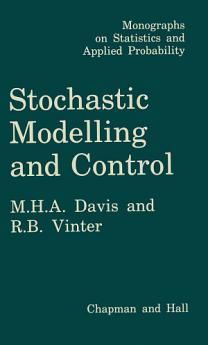Stochastic Modelling and Control
Mark Davis
মার্চ ২০১৩ · Springer Science & Business Media
৫.০star
১টি রিভিউreport
ই-বুক
394
পৃষ্ঠা
reportরেটিং ও রিভিউ যাচাই করা হয়নি আরও জানুন
এই ই-বুকের বিষয়ে
This book aims to provide a unified treatment of input/output modelling and of control for discrete-time dynamical systems subject to random disturbances. The results presented are of wide applica bility in control engineering, operations research, econometric modelling and many other areas. There are two distinct approaches to mathematical modelling of physical systems: a direct analysis of the physical mechanisms that comprise the process, or a 'black box' approach based on analysis of input/output data. The second approach is adopted here, although of course the properties ofthe models we study, which within the limits of linearity are very general, are also relevant to the behaviour of systems represented by such models, however they are arrived at. The type of system we are interested in is a discrete-time or sampled-data system where the relation between input and output is (at least approximately) linear and where additive random dis turbances are also present, so that the behaviour of the system must be investigated by statistical methods. After a preliminary chapter summarizing elements of probability and linear system theory, we introduce in Chapter 2 some general linear stochastic models, both in input/output and state-space form. Chapter 3 concerns filtering theory: estimation of the state of a dynamical system from noisy observations. As well as being an important topic in its own right, filtering theory provides the link, via the so-called innovations representation, between input/output models (as identified by data analysis) and state-space models, as required for much contemporary control theory.
রেটিং ও পর্যালোচনাগুলি
৫.০
১টি রিভিউ
ই-বুকে রেটিং দিন
আপনার মতামত জানান।
পঠন তথ্য
স্মার্টফোন এবং ট্যাবলেট
Android এবং iPad/iPhone এর জন্য Google Play বই অ্যাপ ইনস্টল করুন। এটি আপনার অ্যাকাউন্টের সাথে অটোমেটিক সিঙ্ক হয় ও আপনি অনলাইন বা অফলাইন যাই থাকুন না কেন আপনাকে পড়তে দেয়।
ল্যাপটপ ও কম্পিউটার
Google Play থেকে কেনা অডিওবুক আপনি কম্পিউটারের ওয়েব ব্রাউজারে শুনতে পারেন।
eReader এবং অন্যান্য ডিভাইস
Kobo eReaders-এর মতো e-ink ডিভাইসে পড়তে, আপনাকে একটি ফাইল ডাউনলোড ও আপনার ডিভাইসে ট্রান্সফার করতে হবে। ব্যবহারকারীর উদ্দেশ্যে তৈরি সহায়তা কেন্দ্রতে দেওয়া নির্দেশাবলী অনুসরণ করে যেসব eReader-এ ফাইল পড়া যাবে সেখানে ট্রান্সফার করুন।






